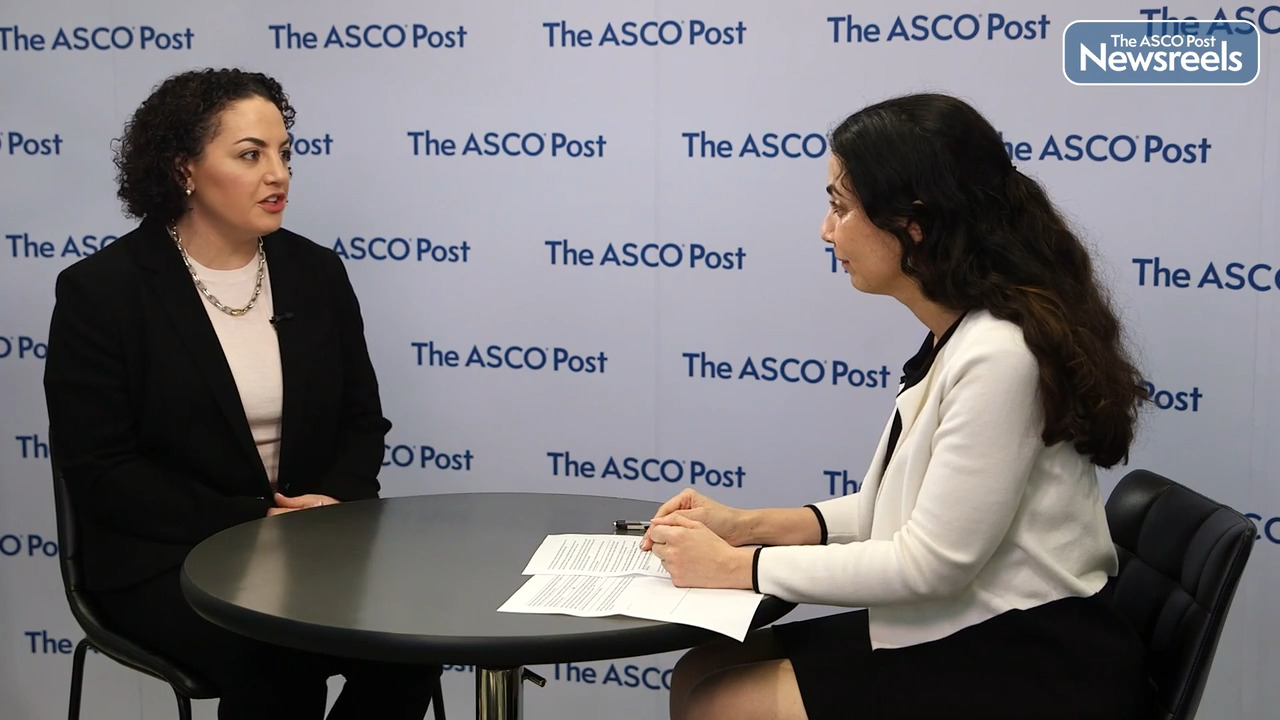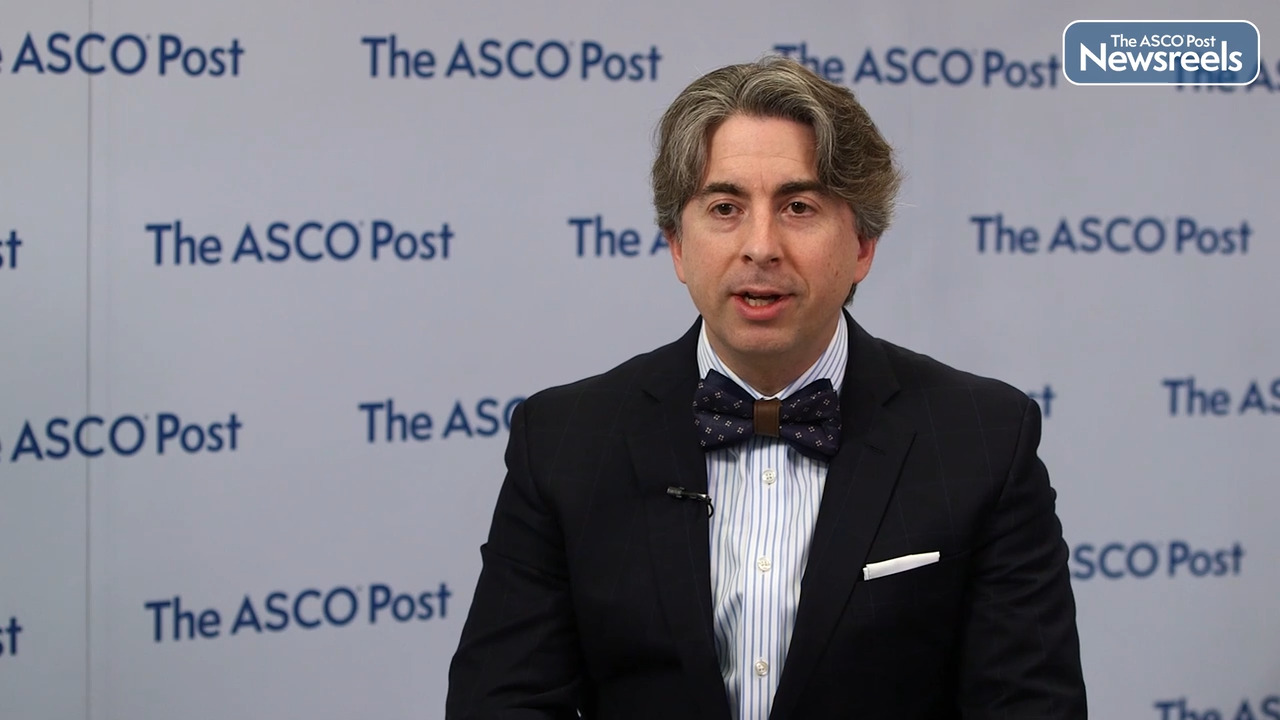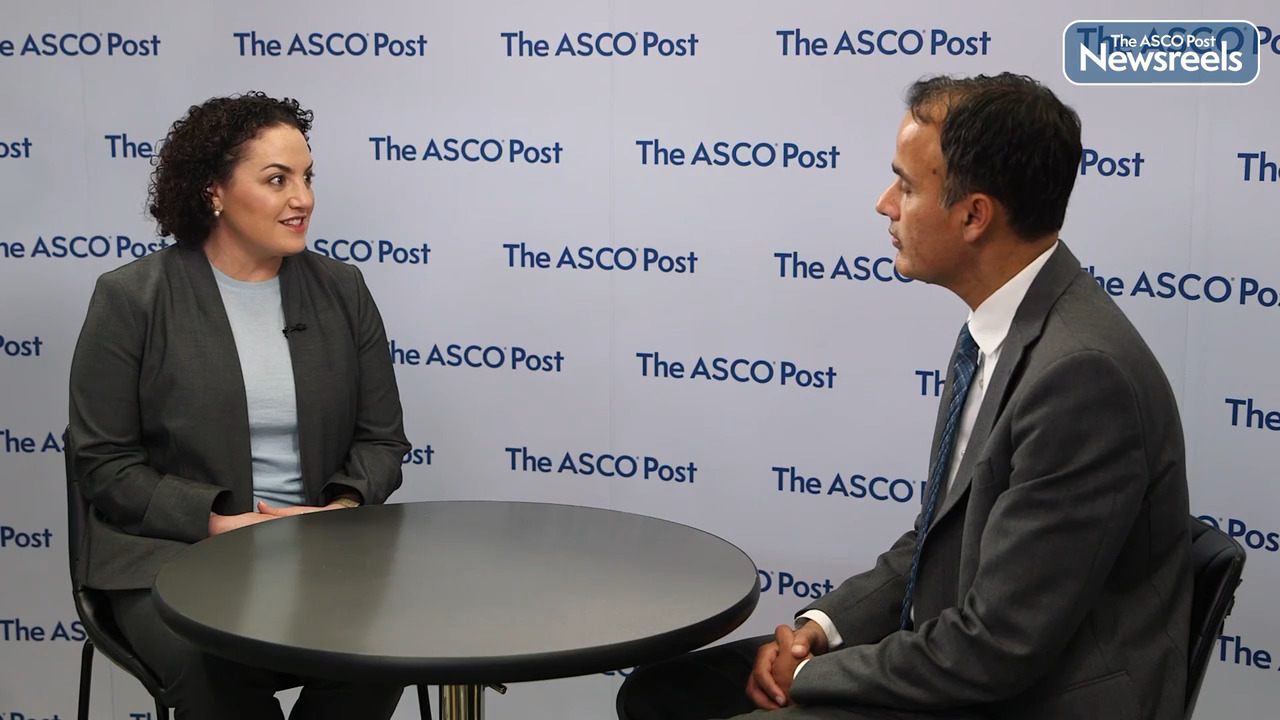Previously Untreated Advanced Melanoma: Addition of Bempegaldesleukin to Nivolumab
In the phase III PIVOT IO 001 trial reported in the Journal of Clinical Oncology, Adi Diab, MD, and colleagues found that the addition of bempegaldesleukin, a pegylated interleukin-2 cytokine prodrug, to nivolumab did not improve treatment outcomes in previously untreated patients with advanced...
More on Melanoma From ASCO 2023: Focus on Two Different Treatment Strategies
In patients with melanoma who are undergoing neoadjuvant therapy with immune checkpoint blockade, response to treatment may guide the intensity of additional treatment, according to a retrospective analysis of two major trials presented by Irene L.M. Reijers, an MD/PhD candidate in the Christian...
Risk Factors for Melanoma Among Individuals Living in Atlantic Canada
Investigators in Canada may have uncovered the factors contributing to the higher risk of melanoma among individuals living in Atlantic regions, according to a recent study published by Lagacé et al in Cancers. These findings may provide insights into effective strategies for skin cancer...
Follow-up of Chronic Immune-Related Adverse Events After Adjuvant Immunotherapy for High-Risk Resected Melanoma
In a retrospective cohort study reported in JAMA Network Open, Goodman et al found that patients receiving adjuvant PD-1 inhibitor therapy for high-risk resected melanoma often had chronic immune-related adverse events, with some persisting over long-term follow-up. Study Details The study included ...
Addition of Neoadjuvant Talimogene Laherparepvec to Surgery in Advanced Melanoma: 5-Year Follow-up
As reported in a research letter in JAMA Oncology by Reinhard Dummer, MD, and colleagues, the final, 5-year analysis of a phase II trial showed continued improvement in outcomes with the addition of neoadjuvant talimogene laherparepvec (T-VEC) to surgery in patients with advanced melanoma. Study...
Ipilimumab Plus Nivolumab May Improve Outcomes in Patients With Refractory Metastatic Melanoma, Study Suggests
Researchers have discovered that ipilimumab in combination with nivolumab may be an effective second-line therapy in patients with PD-1 blockade–refractory metastatic melanoma, according to a recent study published by VanderWalde et al in Nature Medicine. These findings demonstrated the combination ...
FDA Approves Melphalan Hepatic Delivery System for Adult Patients With Unresectable Hepatic-Dominant Metastatic Uveal Melanoma
On August 14, the U.S. Food and Drug Administration (FDA) approved the HEPZATO KIT, a melphalan hepatic delivery system, as a liver-directed treatment for adult patients with metastatic uveal melanoma and unresectable hepatic metastases affecting less than 50% of the liver and no extrahepatic...
Contribution of MEK Inhibition to Combined BRAF/MEK Inhibitor Treatment in Advanced BRAF-Mutant Melanoma
In part 2 of a phase III trial (COLUMBUS) reported in the Journal of Clinical Oncology, Paolo A. Ascierto, MD, and colleagues found evidence that MEK inhibition contributed to positive outcomes with combination BRAF/MEK inhibitor therapy in advanced BRAF V600–mutant melanoma. Study Details As...
Skin Cancer Screenings and Melanoma Outcomes Among Racial and Ethnic Minority Patients
Increased skin cancer screenings may not reduce disparities in the survival rates of patients with melanoma who have darker skin tones, according to a recent study published by Smith et al in JAMA Dermatology. Background Although melanoma—the leading cause of skin cancer mortality—is most common...
Atezolizumab, Vemurafenib, and Cobimetinib in Patients With BRAF V600–Mutated Melanoma and CNS Metastases
A revised report of findings from the phase II TRICOTEL study of atezolizumab, vemurafenib, and cobimetinib in patients with melanoma and central nervous system (CNS) metastases was published in The Lancet Oncology by Reinhard Dummer, MD, and colleagues. The first version of trial findings,...
Adjuvant Nivolumab vs Observation for Patients With Completely Resected Merkel Cell Carcinoma
As reported in The Lancet by Becker et al, an interim analysis of a European phase II study (ADMEC-O) showed that adjuvant nivolumab was associated with a numeric benefit in disease-free survival vs observation in patients with completely resected Merkel cell carcinoma. Study Details In the...
Cetuximab Plus Radiotherapy Shows Activity in Patients With Locally Advanced Cutaneous Squamous Cell Carcinoma
Investigators have discovered that cetuximab in addition to concurrent radiotherapy may be safe and effective at treating patients with locally advanced cutaneous squamous cell carcinoma, according to a recent study published by Chang et al in Oncotarget. Treatment for locally advanced cutaneous...
Fecal Microbiota Transplants Show Potential in Improving Melanoma Treatment
Researchers have found that fecal microbiota transplants from healthy donors may be safe and show potential in improving response rates to immunotherapy in patients with advanced melanoma, according to a phase I study published by Routy et al in Nature Medicine. Background While immunotherapy...
Long-Term Survival Outcomes With Pembrolizumab vs Ipilimumab in Advanced Melanoma: 7-Year Follow-up of KEYNOTE-006
As reported in the Journal of Clinical Oncology by Caroline Robert, MD, PhD, and colleagues, the 7-year follow-up of the phase III KEYNOTE-006 trial has shown a continued overall survival benefit with pembrolizumab vs ipilimumab in patients with advanced melanoma. The primary analysis of the trial...
Curettage and Cryosurgery May Be Effective for Patients With Basal Cell Carcinoma
The combination of curettage and cryosurgery may be a safe and effective treatment method for patients with basal cell carcinoma, according to a novel study published by Backman et al in the Journal of the American Academy of Dermatology. Background The incidence of skin cancer is continuing to...
Expert Point of View: Zeynep Eroglu, MD
The formal discussant of the phase II SWOG S1512 trial was Zeynep Eroglu, MD, of the Department of Cutaneous Oncology at the Moffitt Cancer Center in Tampa, Florida. She congratulated Dr. Kendra and her coauthors for conducting a study in such a rare tumor. “I think we can say desmoplastic melanoma ...
SWOG S1512 Trial: Pembrolizumab Achieves High Response Rates in Rare Type of Melanoma
The immune checkpoint inhibitor pembrolizumab achieved high response rates in patients with unresectable metastatic desmoplastic melanoma, a rare invasive tumor type, according to the results of the phase II SWOG S1512 trial presented at the 2023 American Association for Cancer Research (AACR)...
First-Line Nivolumab/Ipilimumab Followed by Nivolumab in a Clinically Diverse Population With Unresectable Stage III or IV Melanoma
In the phase IIIb CheckMate 401 trial reported in the Journal of Clinical Oncology, Reinhard Dummer, MD, and colleagues described outcomes with first-line nivolumab/ipilimumab followed by nivolumab in a clinically diverse population of patients with unresectable stage III or IV melanoma, including...
Shailender Bhatia, MD, on Merkel Cell Carcinoma: Results From CheckMate 358 on Nivolumab With or Without Ipilimumab
Shailender Bhatia, MD, of the University of Washington and Fred Hutchinson Cancer Center, discusses phase I/II results on the efficacy of nivolumab with or without ipilimumab in patients with recurrent or metastatic Merkel cell carcinoma. The study found that, for this rare and aggressive skin cancer, nivolumab showed clinical activity in advanced disease. However, these results from CheckMate 358 do not suggest an additional benefit with ipilimumab added to nivolumab (Abstract 9506).
Personalized mRNA Vaccines May Transform the Treatment of Melanoma
The rates of survival and disease recurrence improved significantly when a personalized mRNA vaccine tailored to the patients’ tumor genetics was coupled with immunotherapy in those who had undergone surgery for high-risk melanoma, according to novel findings presented by Khattak et al at the 2023...
Microdoses of Incisional Antibiotics and Surgical Site Infections in Surgery for Skin Cancer
In a single-institution study conducted in New Zealand reported in JAMA Surgery, Goh et al found that microdoses of incisional antibiotics may reduce the risk of surgical site infections during surgery for skin cancer, as well as reduce the risk of infections requiring postoperative systemic...
Allison Betof Warner, MD, PhD, and Zeynep Eroglu, MD, on Metastatic Melanoma: New Data on Dabrafenib, Trametinib, and Navitoclax
Allison Betof Warner, MD, PhD, of Stanford University Medical Center, and Zeynep Eroglu, MD, of H. Lee Moffitt Cancer Center and Research Institute, discusses phase II findings showing that in patients with BRAF-mutant metastatic melanoma, dabrafenib plus trametinib and navitoclax (DTN) was associated with a complete response rate of 20% and an overall response rate of 84%. Additionally, there was a trend toward improved overall survival in patients treated with DTN compared with dabrafenib plus trametinib alone; the difference in overall survival was more pronounced in patients with a smaller tumor burden (Abstract 9511).
Jason J. Luke, MD, on Melanoma Adjuvant Therapy: Final Analysis of KEYNOTE-716
Jason J. Luke, MD, of the University of Pittsburgh Medical Center Hillman Cancer Center, discusses adjuvant pembrolizumab, which, in previous results, improved distant metastasis– and recurrence-free survival in patients with resected stage IIB or IIC melanoma vs placebo. After a median follow-up of 39.4 months, adjuvant pembrolizumab continued to show a benefit over placebo, with no new safety signals (Abstract LBA9505).
Allison Betof Warner, MD, PhD, and Adnan Khattak, PhD, MBBS, on High-Risk Resected Melanoma: Survival Results With mRNA-4157 and Pembrolizumab in KEYNOTE-942
Allison Betof Warner, MD, PhD, of Stanford University Medical Center, and Adnan Khattak, MBBS, FRACP, PhD, of Australia’s Hollywood Private Hospital & Edith Cowan University, discuss the use of the mRNA-4157 vaccine in combination with pembrolizumab as adjuvant therapy for resected high-risk melanoma, which prolonged distant metastasis–free survival compared with pembrolizumab alone. These results provide further evidence that a personalized neoantigen approach is potentially beneficial (Abstract LBA9503).
Georgina V. Long, MD, PhD, on Resected Melanoma: Biomarkers for and Efficacy of Adjuvant Nivolumab vs Placebo
Georgina V. Long, MD, PhD, of Melanoma Institute Australia and The University of Sydney, discusses new data showing that patients with resected stage IIB/C melanoma who were treated with adjuvant nivolumab had prolonged recurrence-free survival compared with placebo across all biomarker subgroups. The baseline biomarkers most predictive of prolonged recurrence-free survival with nivolumab were high interferon gamma score, high tumor mutational burden, CD8 T-cell infiltration, and low C-reactive protein (Abstract 9504).
Omid Hamid, MD, on Advanced Melanoma: Durable Response With Fianlimab Plus Cemiplimab
Omid Hamid, MD, of The Angeles Clinic & Research Institute, discusses study findings on fianlimab plus cemiplimab-rwlc, which showed clinical activity in patients with advanced melanoma, comparing favorably with other approved combinations of immune checkpoint inhibitors in the same clinical setting. This is the first indication that dual LAG-3 blockade may produce a high level of activity with significant overall response rate after adjuvant anti–PD-1 treatment. A phase III trial of this regimen in treatment-naive patients with advanced melanoma is ongoing (Abstract 9501).
Diffusing Alpha-Emitter Radiation Therapy for Recurrent or Unresectable Skin Cancers
In a small study reported in JAMA Network Open, D’Andrea et al found that diffusing alpha-emitter radiation therapy—a novel solid tumor management strategy using alpha-particle interstitial brachytherapy—appeared to be safe and showed activity in patients with recurrent or unresectable skin...
A Love of Immunology Leads to a Notable Career in Dermatology, With a Focus on Melanoma Research and Treatment
Caroline Robert, MD, PhD, Head of the Dermatology Unit at Gustave Roussy and Co-Director of the Melanoma Research Unit at INSERM 981 Paris-Sud University, was born and reared in Paris. “I didn’t have a vocation for medicine when I was a kid; I wanted to be an archeologist. I’m not from a medical...
Retifanlimab-dlwr for Metastatic or Recurrent Locally Advanced Merkel Cell Carcinoma
On March 22, 2023, the anti–PD-1 antibody retifanlimab-dlwr was granted accelerated approval for adults with metastatic or recurrent locally advanced Merkel cell carcinoma.1 Supporting Efficacy Data Approval was based on findings in POD1UM-201 (ClinicalTrials.gov identifier NCT03599713), a...
Study Shows mRNA-Based Personalized Vaccine Plus Pembrolizumab Active in Melanoma for the First Time
The search for an effective cancer vaccine has been frustrating, but finally there may be light at the end of the tunnel. Adjuvant use of an investigational personalized mRNA vaccine (mRNA-4157) plus the PD-1 inhibitor pembrolizumab improved recurrence-free survival vs pembrolizumab alone in...
Marcus O. Butler, MD, on Uveal Melanoma: Tebentafusp and Evidence of Tumor Response
Marcus O. Butler, MD, of Toronto’s Princess Margaret Cancer Centre, discusses evidence of tumor response in orbital lesions treated with tebentafusp in patients with metastatic uveal melanoma. Tebentafusp is a first-in-class novel bispecific protein, the first therapy to show superior overall survival compared with standard therapy for metastatic uveal melanoma. Based on these study findings, a role for this agent as a neoadjuvant treatment warrants further investigation. (Abstract LB 118/1)
Researchers Study Genetic Changes Across Multiple Organs of Metastatic Melanoma
Researchers have found that studying the landscape of DNA and RNA alterations across multiple organs of metastasis may provide a new direction in cancer therapeutics to address treatment failure, according to a new study published by Liu et al in Nature Medicine. The new findings from analyzing...
Jeffrey S. Weber, MD, PhD, on Melanoma: New Data on a Cancer Vaccine Combined With Pembrolizumab
Jeffrey S. Weber, MD, PhD, of the Perlmutter Cancer Center at New York University Langone, discusses efficacy and safety results from the phase II KEYNOTE-942 trial, which showed that a personalized mRNA-based cancer vaccine, combined with the immune checkpoint inhibitor pembrolizumab, improved recurrence-free survival compared with pembrolizumab alone in patients with high-risk melanoma. The clinical benefit was observed regardless of the tumor mutational burden status. (Abstract CT001)
Single-Agent Pembrolizumab May Benefit Patients With Advanced Desmoplastic Melanoma
Monotherapy with pembrolizumab led to clinical responses in 89% of patients with unresectable metastatic desmoplastic melanoma, according to results from the phase II S1512 clinical trial presented by Kendra et al at the American Association for Cancer Research (AACR) Annual Meeting 2023 (Abstract...
Personalized mRNA-Based Cancer Vaccine Plus Pembrolizumab for High-Risk Melanoma
mRNA-4157/V940, a personalized mRNA-based cancer vaccine, in combination with the immune checkpoint inhibitor pembrolizumab improved recurrence-free survival compared with pembrolizumab alone in patients with high-risk melanoma, and clinical benefit was observed regardless of tumor mutational...
Prior CTLA-4 Inhibition May Influence Response to PD-1 Inhibitors in Patients With Advanced Melanoma
Researchers have found that responses to PD-1 inhibitor treatment in patients with advanced melanoma may depend on whether they had received previous treatment with CTLA-4 inhibitors, according to a new study published by Campbell et al in Cancer Cell. “In our large set of data, features that have...
Neoadjuvant Pembrolizumab in Desmoplastic Melanoma
Neoadjuvant pembrolizumab may significantly improve the management of desmoplastic melanoma, increasing the likelihood of successful resection and reducing the need for further surgery or radiation therapy, according to the response data presented at the 2022 ASCO Annual Meeting, with the surgical...
Nivolumab Injected Directly Into Spinal Fluid May Be Safe and Effective for Some Patients With Melanoma Who Have Leptomeningeal Disease
Researchers have found that a novel approach to administer intrathecal and intravenous nivolumab has proven safe and improved survival in a subset of patients who developed leptomeningeal disease from metastatic melanoma, according to a new study published by Glitza Olivia et al in Nature ...
Researchers Uncover How Advanced Melanoma May Resist Treatment at the End of Life
Researchers have revealed the potential mechanisms contributing to treatment resistance in patients with melanoma at the end of life, according to a new study published by Spain et al in Cancer Discovery. “These results present the most detailed picture yet of what melanoma looks like at the final...
Naporafenib Plus Trametinib in Advanced NRAS-Mutant Melanoma
As reported in the Journal of Clinical Oncology by de Braud et al, findings in the expansion cohort of a phase Ib trial indicate activity with the combination of the BRAF/CRAF kinase inhibitor naporafenib and trametinib in patients with advanced or metastatic NRAS-mutant melanoma. Study Details In ...
FDA Grants Accelerated Approval to Retifanlimab-dlwr for Metastatic or Recurrent Locally Advanced Merkel Cell Carcinoma
On March 22, the U.S. Food and Drug Administration (FDA) granted accelerated approval to the PD-1 inhibitor retifanlimab-dlwr (Zynyz) for adult patients with metastatic or recurrent locally advanced Merkel cell carcinoma. PODIUM-201 Safety and efficacy were evaluated in PODIUM-201...
Isolated Hepatic Perfusion May Improve Response and Survival Among Patients With Metastatic Uveal Melanoma
An advanced surgical therapy may be more efficacious than conventional treatments for patients with uveal melanoma that has spread to the liver, according to results from the phase III SCANDIUM trial published by Bagge et al in the Journal of Clinical Oncology. Infusing the liver with high doses of ...
Nicotinamide for Chemoprevention of Skin Cancer in Solid Organ Transplant Recipients
In an Australian phase III trial (ONTRANS) reported in The New England Journal of Medicine, Allen et al found that 1 year of treatment with nicotinamide (vitamin B3) vs placebo did not reduce the risk of keratinocyte cancers or actinic keratoses in immunosuppressed solid organ transplant...
Fewer Cases of Melanoma and Extracutaneous Malignancies Detected Among Patients With Atopic Diseases
Researchers have found that patients with a history of atopic diseases may be less likely to develop melanoma than patients with a history of nonatopic diseases, according to a new study published by Komulainen et al in Melanoma Research. The findings also revealed that patients with atopic...
Neoadjuvant Plus Adjuvant vs Adjuvant Pembrolizumab in Advanced Melanoma
In the phase II SWOG Cancer Research Network S1801 trial reported in The New England Journal of Medicine, Sapna P. Patel, MD, and colleagues found that neoadjuvant plus adjuvant pembrolizumab significantly improved event-free survival vs adjuvant pembrolizumab alone in patients with stage IIIB to...
Mediterranean Diet and Immune Checkpoint Blockade Outcomes in Advanced Melanoma
In the PRIMM study reported in JAMA Oncology, Bolte et al found that consumption of a Mediterranean diet was associated with a high probability of objective response and 12-month progression-free survival among patients receiving immune checkpoint blockade treatment for advanced melanoma. As stated ...
Nivolumab and Relatlimab in Patients With Advanced Melanoma Progressing on Anti–PD-1/PD-L1 Therapy
As reported in the Journal of Clinical Oncology by Paolo Antonio Ascierto, MD, and colleagues, the phase I/IIa RELATIVITY-020 trial part D has shown evidence of activity of the combination of nivolumab and relatlimab in patients with advanced melanoma progressing on anti–PD-1/PD-L1 therapy. Study...
Grateful to Be Alive
Although there is no history of cancer in my family, I guess it isn’t surprising that I would develop an aggressive form of melanoma on my scalp after years of ultraviolet radiation from sun exposure. Still, getting the diagnosis was devastating. I first noticed a small lump on the top of my head ...
Emerging Second- and Third-Line Therapies for Unresectable and Metastatic Melanoma
This is Part 4 of Updates in Melanoma, a four-part video roundtable series. Scroll down to watch the other videos from this Roundtable. In this video, Drs. Omid Hamid, Sapna Patel, and Ryan Sullivan discuss the second- and third-line therapy options for unresectable and metastatic melanoma. The patient is a 55-year-old man diagnosed with metastatic melanoma that has spread to the lung and liver. He was previously treated with combination checkpoint inhibitor therapy without benefit, and his providers are debating the next steps. The faculty review the recent data in advanced melanoma in the second line and beyond, focusing in particular on tumor-infiltrating lymphocyte (TIL) therapy. They provide an overview of what the practicing clinician and patients should know about TIL therapy, the logistics involved, and recent data.
First-Line Therapy for Metastatic Malignant Melanoma
This is Part 3 of Updates in Melanoma, a four-part video roundtable series. Scroll down to watch the other videos from this Roundtable. In this video, Drs. Omid Hamid, Sapna Patel, and Ryan Sullivan discuss the first-line treatment of metastatic melanoma. The patient is a 32-year-old woman recently diagnosed with BRAF V600E–negative melanoma that has metastasized to the liver. MRI of the brain was negative, her EVOG performance score is 1, and she has no contraindications to targeted therapy or immune checkpoint inhibitors. The faculty review the changing first-line treatment landscape in metastatic and unresectable melanoma, discussing the many immunotherapy combinations that have entered the field. In particular, they highlight the results of the recent RELATIVITY-047, CheckMate 067, and DREAMseq trials.










